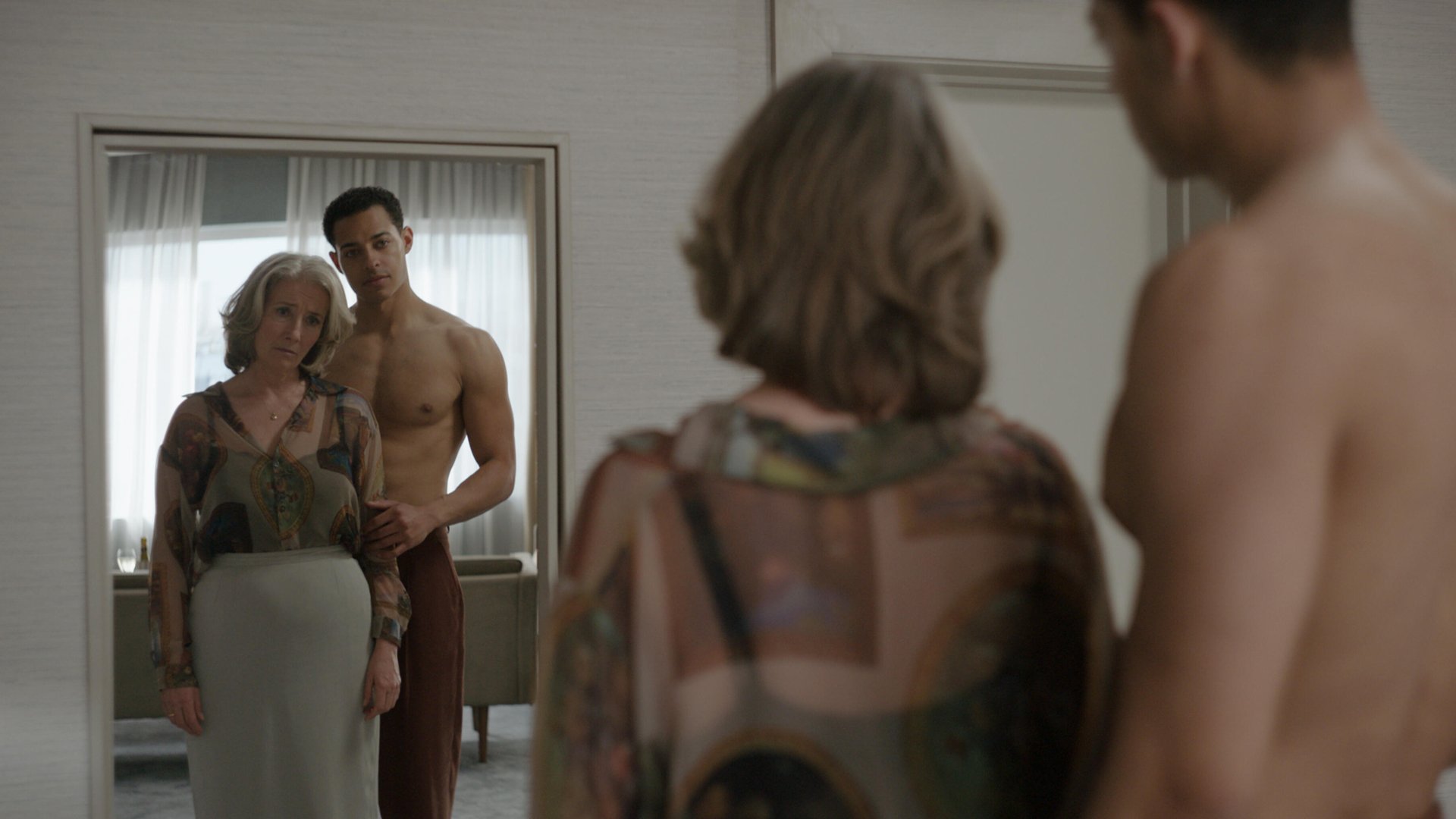‘Good Luck to You, Leo Grande’ review: Respect, consent, and boundaries come first

“It’s an orgasm, not a Fabergé egg. People have them every day.”
Katy Brand’s spectacularly sharp script for Good Luck to You, Leo Grande is full of witticisms like this, with every moment fueled by smart discussion of sex, sex work, how important consent and respecting boundaries are to mutual pleasure, and of thinking beyond your own experience.
Directed by Sophie Hyde, this wholly sex-positive film is itself as unpredictable in its subtleties as it is powerful in its exploration of compassion, body image, ageism, and outdated social ideas about pleasure. Emma Thompson is characteristically brilliant as Nancy Stokes, a sexually repressed former teacher with naught but a skerrick of self-confidence, who, two years since her husband died, decides to hire sex worker Leo Grande, played by staggeringly talented newcomer Daryl McCormack. We’re not told what immediately preceded this decision, but Thompson brings an anxiously self-interrogating energy to Nancy, who’s never really thought about her own pleasure or needs — it’s clear her only sexual relationship was devoid of any value for Nancy’s desires.
McCormack is utterly compelling as the titular Leo Grande, whose self-confidence, compassion, and pride — both in himself and his work — comes through the very first moment he steps through Nancy’s hotel room door. McCormack takes Brand’s script and weaves from it a truly charismatic character whose ability to alleviate tension with empathetic finesse is truly exceptional. Leo’s emotional intelligence enables him to see that Nancy, full of judgement and inhibition, views herself solely from the outside — a revelation that plays out in several mirror-facing scenes.
Set over four meetings, the film feels more like a play, contained almost entirely to the walls of the hotel room at The Duffield, yet moving through nuanced stages of each character’s development so seamlessly that an hour and 37 minutes doesn’t feel it at all.

The film champions mutual pleasure as one of the most important elements of sex, making sure each person’s needs are heard, understood, respected, and explored. Nancy has never had an orgasm. Not one. It’s something she’s never prioritised for herself, nor did her late husband. It’s also something she actually doesn’t think possible, which is unsurprising, as her one sexual partner seemingly had no interest in asking Nancy what she enjoyed. Thompson plays through this with expert care, having Nancy act out the typical stages of their passionless sexual interactions like clockwork (fake orgasm included) and laugh off what Mashable features editor and Rough author Rachel Thompson might call “unwanted sex” as an acceptable experience. Nancy describes her sex life as having had “no deviation for 31 years.”
As a result, Nancy’s fantasies and desires, which rarely extend beyond “getting it over with,” are as limited as her own sex education. What’s more, her feelings of shame over asking for what she wants are apparent throughout the whole film. In perfectly deadpan delivery from Thompson, Nancy literally makes a list of “attainment goals,” or rather, sex positions she’d like to “get through” in a couple of hours, popping on her reading glasses and frankly announcing each one to a bemused Leo. It’s in moments like this that Brand’s script is exceptionally funny, amplifying an awkward mixture of Nancy’s keep-calm-and-carry-on attitude with the discomfort around her own desires.

The importance of ongoing consent lies at the core of Leo Grande as a truly intimate, deliberate theme. The film does not miss a beat here, with Leo leading by example by taking physical, verbal, and energetic cues from Nancy, asking for consent for every single intimate action, from simply kissing Nancy on the cheek to dancing to an Alabama Shakes song as a means to shake off Nancy’s inhibitions. Leo’s expertise in empathetic mood adjustment is refreshingly comforting to watch — and should serve as a tutorial for the audience, to be honest. Nancy also continually asks for consent for physical connection, however she fails to do this for his personal boundaries.
It’s here the film makes clear the power of setting boundaries, and the feeling of powerlessness and frustration that comes from having yours disrespected or crossed. Leo communicates his clearly, as does Nancy, however, she crosses his boundaries more than once, persistently coaxing personal information from him and ultimately leaping past one of Leo’s most valued parameters: the separation of his professional and personal life, and protection of his identity as a sex worker. This breach of trust leads to a truly spectacular and devastating monologue from McCormack.

As such, Nancy’s sexual awakening is not her only journey, as she also opens up to self-love through debates about body image and age with Leo. Nancy’s lack of self-confidence and contempt for her body comes from a deep, socially ingrained, patriarchal place — one Thompson expertly peppers throughout her performance, moving toward a wonderful moment of body neutrality for the character.
However, Nancy is initially steadfast in her views, having quite the tendency to lean toward misogynist rhetoric blaming young women’s attire for sexual harassment and openly spewing a sort of conservative moral panic about sex work to Leo’s face. She constantly asks what his family thinks about his work and how he feels about it himself, specifically whether he feels “degraded” by it. Nancy tells Leo she quite literally used to set her students’ “essays on the moral issues surrounding sex work, and here I am participating in it.”
Without being a PowerPoint presentation advocating the full decriminalisation of sex work, the film fosters ample discussion of the profession, with Leo expertly navigating Nancy’s judgmental, pre-conceived notions of the sex industry and the experiences of sex workers. Leo patiently, even playfully, deflects her barrage of insensitive questions with a wry smile, telling her, “There’s nothing crass about getting paid for your work.”
In these discussions, which are some of the film’s most important, Leo makes clear to Nancy, more than once, that “You haven’t bought me. You’ve bought my services. I set a price and you agreed. I’m not being exploited.” He doesn’t avoid speaking to sex worker safety, but explains how he values his work deeply as a public service that meets people’s emotional and physical needs. “Think how civilised it could be,” he says. Here, Thompson allows Nancy to truly listen and address her own bias, but also realistically limits this as, later, Nancy emotionally wounds Leo in a moment of blatant disrespect for his dignity that signals an unambiguous point of no return.
By foregrounding themes of desire and mutual pleasure with that of ongoing consent and acknowledgment of boundaries, Good Luck to You, Leo Grande spotlights the importance of simultaneously respecting yourself and others when it comes to sex. Under Hyde’s intimate direction, Thompson and McCormack take Brand’s script and work with it to create a truly nuanced and playful exploration of wants, needs, and compassion. Good luck to it.
Good Luck to You, Leo Grande is now in cinemas and streaming on Hulu.